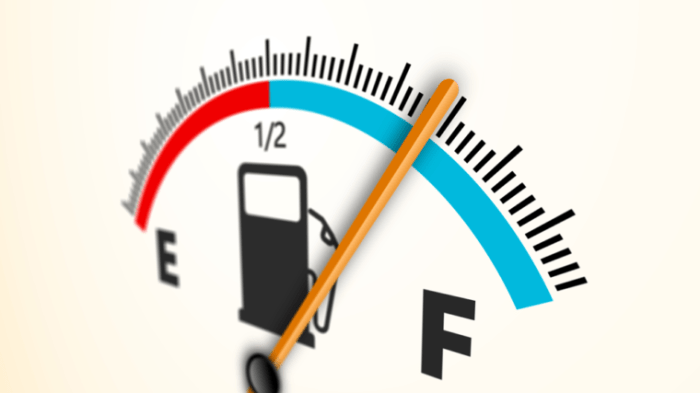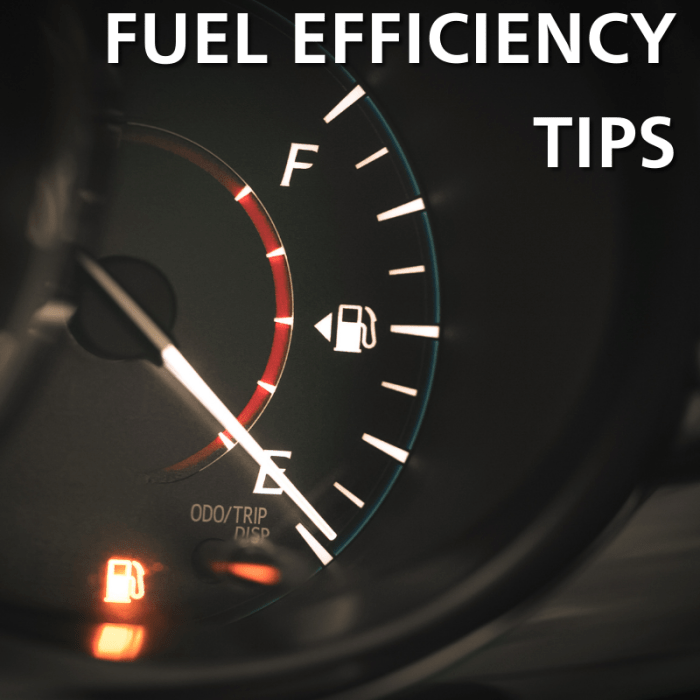Fuel efficiency tips are key to reducing carbon emissions, saving money, and helping the environment. By adopting smart driving habits and proper vehicle maintenance, you can make a significant impact. Let’s dive into some practical tips to maximize your fuel efficiency and minimize your carbon footprint.
Importance of Fuel Efficiency: Fuel Efficiency Tips

When it comes to reducing carbon emissions, fuel efficiency plays a crucial role in minimizing the environmental impact of vehicles on our planet. By utilizing fuel-efficient driving habits, individuals can significantly lower their carbon footprint and contribute to the conservation of our environment.
How Fuel-Efficient Driving Habits Help the Environment
- Reducing idling time can save fuel and decrease harmful emissions.
- Maintaining proper tire pressure can improve fuel efficiency and reduce CO2 emissions.
- Driving at a moderate speed and avoiding sudden accelerations can also enhance fuel efficiency.
Saving Money through Improved Fuel Efficiency
- Regular maintenance of the vehicle, such as oil changes and filter replacements, can improve fuel efficiency and save money in the long run.
- Carpooling or using public transportation can reduce fuel costs and benefit both the environment and personal finances.
- Investing in a fuel-efficient vehicle or considering hybrid/electric options can lead to significant savings on fuel expenses over time.
Fuel-Efficient Driving Habits

When it comes to fuel efficiency, your driving habits play a crucial role in how much fuel your vehicle consumes. By adopting certain practices on the road, you can maximize your fuel efficiency and save money in the long run.
Avoid Common Fuel-Wasting Behaviors
- Avoid aggressive driving, such as speeding, rapid acceleration, and sudden braking, as it can significantly increase fuel consumption.
- Idling for extended periods wastes fuel unnecessarily. Turn off your engine if you anticipate being parked for more than a minute.
- Carry unnecessary weight in your vehicle can also impact fuel efficiency. Remove any items that are not needed for your trip.
Benefits of Maintaining a Steady Speed
Maintaining a steady speed while driving can greatly improve fuel efficiency. By avoiding constant acceleration and deceleration, you can reduce the amount of fuel your vehicle consumes. When driving on the highway, try to use cruise control to help maintain a consistent speed and optimize fuel efficiency.
Impact of Proper Tire Maintenance
Proper tire maintenance is essential for fuel efficiency. Underinflated tires can increase rolling resistance, causing your vehicle to consume more fuel. Regularly check your tire pressure and ensure they are inflated to the recommended level. Additionally, make sure your tires are properly aligned and balanced to further improve fuel efficiency.
Vehicle Maintenance for Better Fuel Efficiency
Regular vehicle maintenance plays a crucial role in ensuring optimal fuel efficiency. By taking care of your car’s engine and components, you can improve gas mileage and reduce overall fuel consumption.
Engine Maintenance Tips
- Regularly check and replace spark plugs as needed to ensure efficient combustion.
- Keep the engine properly tuned to prevent fuel wastage and maintain peak performance.
- Monitor and maintain proper tire pressure to reduce rolling resistance and improve fuel efficiency.
Air Filters for Fuel Efficiency, Fuel efficiency tips
Air filters play a vital role in maintaining optimal fuel consumption by ensuring clean air reaches the engine. Clogged or dirty air filters can restrict airflow, leading to decreased fuel efficiency. Regularly inspect and replace air filters according to the manufacturer’s recommendations to maximize fuel efficiency.
Recommended Grade of Motor Oil
Using the recommended grade of motor oil is essential for fuel efficiency. The right motor oil helps reduce friction between moving parts in the engine, leading to improved overall performance and fuel economy. Always refer to your vehicle’s manual to determine the appropriate motor oil grade for optimal fuel efficiency.
Fuel-Efficient Vehicle Choices
When it comes to choosing a fuel-efficient vehicle, there are several options available in the market. Each type of vehicle has its own set of pros and cons, so it’s important to consider your specific needs and preferences before making a decision. Here, we will discuss the different types of fuel-efficient vehicles and provide tips on choosing the right one for better fuel economy.
Hybrid Vehicles
Hybrid vehicles combine an internal combustion engine with an electric motor, resulting in improved fuel efficiency. They are great for city driving and stop-and-go traffic, as they can switch between the engine and electric power seamlessly. However, they tend to be more expensive upfront compared to traditional petrol or diesel vehicles.
Electric Vehicles
Electric vehicles run solely on electric power, producing zero emissions. They are extremely fuel-efficient and environmentally friendly, making them a popular choice for eco-conscious drivers. However, the limited range and availability of charging stations can be a drawback for some users.
Fuel-Efficient Petrol/Diesel Vehicles
Fuel-efficient petrol or diesel vehicles are designed to optimize fuel consumption without the use of electric components. They are typically more affordable than hybrid or electric vehicles and offer a good balance between fuel efficiency and performance. However, they may not be as environmentally friendly as their electric counterparts.
Choosing the Right Size and Weight
When selecting a fuel-efficient vehicle, consider the size and weight of the car. Smaller and lighter vehicles tend to be more fuel-efficient than larger, heavier ones. Opt for a vehicle size that meets your needs without excessive space and weight that can impact fuel economy negatively.

